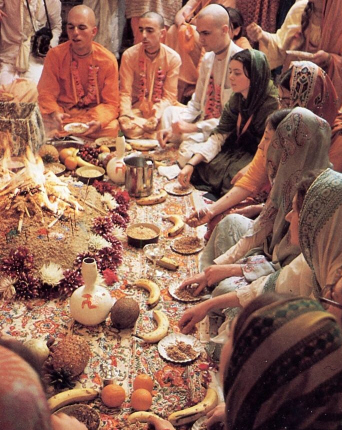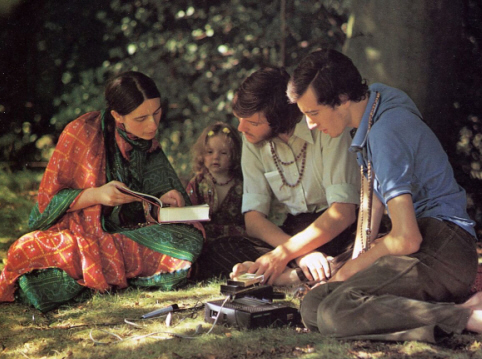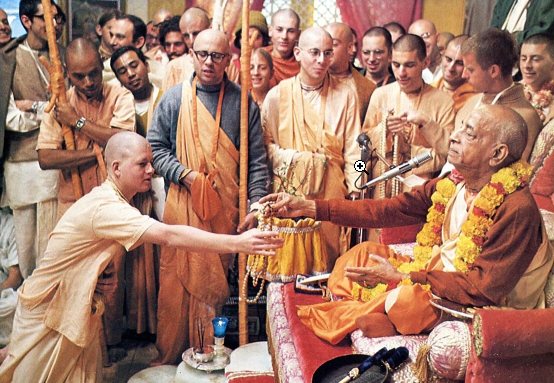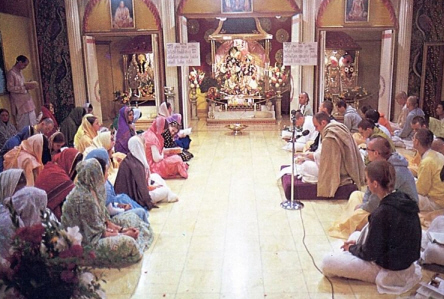
If a casual onlooker attends an initiation ceremony at a Hare Krsna temple, he will find the action colorful and absorbing, but most likely he will be bewildered as to what it all means. For a typical initiation, about one hundred devotees gather in the temple. The men and women to be initiated perhaps a dozen of them sit in two rows, facing the devotee designated to be the priest of the ceremony. The priest sits on a pillow before a smooth dirt mound about three feet square, which is decorated with incense and flowers. Later, during the ceremony, a fire will be built on this mound. Beside the mound is a stack of firewood, five bowls of brightly dyed rice flour, and bowls of sesame and barley seeds, clarified butter, fruits and spices. Objects considered auspicious in the Vedic culture, such as large banana leaves, coconuts, flower garlands, and clay pots filled with water, decorate the temple. Throughout the ceremony, except during a lecture by the priest, all the devotees individually chant the maha-mantra Hare Krsna, Hare Krsna, Krsna Krsna, Hare Hare/ Hare Rama, Hare Rama, Rama Rama, Hare Hare. The sound of many voices chanting produces the powerful effect of a droning, humming prayer.
Often these ceremonies are held in the presence of His Divine Grace A.C. Bhaktivedanta Swami Prabhupada, the founder and spiritual master of the Hare Krsna movement. In that case, the most important moment for the initiate comes when Srila Prabhupada calls him forward to be accepted as a disciple. The devotee bows before his spiritual master and then stands before him face to face. "Do you know the four rules?" Srila Prabhupada asks. "Yes," he answers. "How many rounds do you chant daily?" The disciple answers, "At least sixteen rounds." Srila Prabhupada nods: "All right. Try to avoid the ten offenses. Your name is Govinda dasa." The other devotees then congratulate their new Godbrother.
But what does all this mean? What are these four rules and ten offenses? And why rules? What are these initiates agreeing to? How did apparently ordinary people change to become disciples at a Hare Krsna initiation? To understand what is going on at the initiation ceremony and what has led these people to become disciples and to understand how one goes about becoming a disciple let us look back from the time of the ceremony to the time when the initiates first heard about Krsna consciousness.
The first invitation may come in many different ways. "Someone gave me a book about Krsna," recalls one devotee. "The Hare Krsna people came to speak at our school,"says another. "They held a festival in my town." "I met one on the street, and we talked." Because of the active preaching of the Hare Krsna devotees, thousands of people daily hear something about Krsna consciousness. But when some people hear they become eager to hear more, whereas others do not.
The hearing that sparks initial attraction to Krsna is called, in Sanskrit, sraddha, which means "faithful hearing." Of course, when we speak of "faith" we risk the immediate distaste of atheists and agnostics, and if we say "faith in God," they sour. But such faith is exactly what is required. Sometimes they argue, "Krsna consciousness requires faith even in the beginning? We'll never accept something simply on faith." The materialistic investigator says, "We must experiment, prove, give evidence, and even then we never say that something is true. We constantly experiment and revise." Nevertheless, although materialistic scientists and scholars constantly revise their latest versions of the truth, they cannot rightly assert that they have done away with faith. We find, rather, that everyone places his faith in something or someone. One may not have the faith to join a society for God consciousness, but then he has faith instead that if he joins the Bank of America, for example, his money will be safe. Or he has faith, as most people do, in news reports and airline schedules, or in the quality of the food he buys, although he cannot always inspect it. A man even has enough faith in his barber to allow him to shave his throat with a sharp razor. Krsna consciousness, however, means to have unflinching trust, not in barbers and news media, but in something sublime.
Yet Krsna conscious faith is never blind, for it is based on knowledge. Lord Krsna discusses different aspects of faith in Chapter Seventeen of Bhagavad-gita. "The living being is said to be of a particular faith," the Lord explains, "according to the modes he has acquired." Srila Prabhupada comments upon this verse, "Everyone has a particular type of faith, but his faith is considered good, passionate or ignorant according to the nature he has acquired. The real fact is that every living being is originally the fragmental part of the Supreme Lord. But when one forgets his relationship with the Supreme Personality of Godhead and comes into contact with the material nature, the resultant artificial faith is only material." A Krsna conscious person, however, has faith in great authorities, such as Lord Krsna and the disciplic succession of spiritual masters, whose words are always in accord with the Vedic literature, originally spoken by God. A communist places his trust in Marx or Lenin, but a devotee trusts Lord Krsna, the speaker of Bhagavad-gita. Both have faith, but beyond that one must examine whether the leader or authority he trusts is perfect. In the beginning, one may not ac cept or understand that Krsna is the all-perfect Personality of Godhead, the source of everything spiritual and material, but a faithful person thinks, "These people are speaking something about God consciousness. Let me hear what they have to say." This is sraddha, faithful hearing, the first step in Krsna consciousness. One who has sraddha will go further; one who does not will turn away.

According to Bhagavad-gita, the inclination to hear topics about Krsna develops progressively from life to life. Thus one who in his past life took to spirituality but could not follow it to perfection takes to it again in the next life automatically, from where he left off. In any case, authorities in Krsna consciousness tell us that hearing about Krsna in the association of devotees of the Supreme Lord is the perfect religious process for enhancing one's spiritual development. The prospective devotee, therefore, likes to hear about Krsna consciousness and to hear the chanting of Hare Krsna.
The next step is a natural one: the person who is hearing wants to hear more. Only to spend his spare time reading books like Bhagavad-gita and Srimad-Bhagavatam is no longer enough. He wants more association, and not just with the books but with people who understand the books and follow their instructions. The Vedas explicitly say, "Unless one associates with devotees, one cannot develop love of God; one cannot achieve it on one's own." In the Gita Lord Krsna describes the lives of such devotees: "The thoughts of My pure devotees dwell in Me, their lives are surrendered to Me, and they derive great satisfaction and bliss enlightening one another and conversing about Me."
The beginning candidate starts to find his materialistic association unsatisfying. Usually he tries to introduce Krsna conscious ideas to his own family or friends. Sometimes he is successful and his friends also want to hear about Krsna, but often they think he has gone crazy. In any case, he decides to seek practical advice from advanced devotees on how to proceed further in Krsna consciousness. He visits the temple more frequently, reveals his mind to the devotees, and spends more time chanting and reading.
By now, having progressed by hearing, he desires friendship with the Lord's devotees and even thinks ahead to his relationship with the spiritual master. The Vedic literature repeatedly stresses that saintly association is the most important necessity in spiritual life. The Nectar of Devotion, the Complete Science of Bhakti-Yoga, enumerates the most important principles of devotional service. The first three are as follows: (1) accepting the shelter of the lotus feet of a bona fide spiritual master, (2) becoming initiated by the spiritual master and learning from him how to discharge devotional service, and (3) obeying the orders of the spiritual master with faith and devotion. From reading or from hearing lectures, one may also learn this verse from theKatha Upanisad: "To learn that transcendental science, one must approach a bona fide spiritual master who appears in the disciplic succession and who is fixed in the truth." Or this famous quotation from Bhagavad-gita: "Just try to learn the truth by approaching a spiritual master. Inquire from him submissively…"
Friendship with the devotees is one thing, but approaching the spiritual master means surrendering to him and following his instructions. Is the candidate ready to do it? He becomes thoughtful. According to the Vedic system, one should stay with a spiritual master for a year before deciding whether to accept him as one's guru, and the guru also should observe the candidate for a year to ascertain whether he is eligible. Whether to surrender to a spiritual master is the most important choice in life, and it should be considered as thoroughly as possible. Having read some of the books and associated with devotees, one may consider his decision in this way: "I have heard from the Vedic literatures that I must take initiation. I must use this human life to go back to Godhead and become free from birth and death in the material world. I have heard it, but now what am I going to do about it?"
If one finds that he does not deeply desire to live in the Absolute Truth, he should not seek initiation from a spiritual master. If he is not serious, why make a superficial commitment to the spiritual path? Unfortunately, however, it has become fashionable to accept a spiritual master as one would accept a pet. Especially from India, many cheaters have come for those who are insincere about spiritual life but who want to be flattered that they are making spiritual advancement. They take to spiritual life as a kind of recreation. Nowadays we commonly hear how so-called gurus have taken money and cheated their disciples with bogus teachings. A serious candidate, therefore, may be hesitant about surrendering to a spiritual master, for he wants to be sure that he does not naively accept someone who will cheat him.

To find a real spiritual master is crucial. However, there is a standard way to ascertain who is a genuine guru. All the Vedic literature proclaims that the Absolute Truth is the Supreme Personality of Godhead, Lord Krsna. As stated in the Rg Veda, "Visnu is the Supreme, and those who are godly think only of His lotus feet." Lord Visnu, or Krsna, is the ultimate object of all paths of meditation and yoga. The spiritual master, therefore, is one who preaches the message of Krsna without adulteration. We have already quoted from Bhagavad-gita, wherein Lord Krsna Himself advises, "Try to learn the truth by approaching a spiritual master." In the verse after that, the Lord says, "And when you have learned the truth from the guru, you will know that all beings are but part of Me and that they are in Me, and are Mine." If a so-called spiritual master does not present Krsna as the highest truth, if he changes the message originally spoken by Krsna or if he concocts teachings of his own, he cannot be considered a genuine guru. To be genuine, the guru must follow the instructions of another genuine guru who comes in the disciplic succession from Krsna. If one is sincere, the Lord, who is within everyone's heart, will guide him in taking the right step by approaching the genuine teacher, not a pretender. If one desires real spiritual life, Krsna will help him. But if he wants something else, Krsna may allow him to be cheated.
If one is convinced that he has indeed found a genuine spiritual master, the next step is to follow his instructions. Srila Prabhupada's most basic request to everyone is that one chant the Hare Krsna mantra. One need not be initiated to begin chanting. The chanting is recommended for everyone, in all circumstances. In fact, the scriptures recommend chanting the holy names of God as the only suitable means of God realization in our present age of quarrel and hypocrisy (Kali-yuga). The name of Krsna is not different from Krsna Himself, and therefore chanting brings one into direct contact with Krsna. As stated in the scripture Narada-pancaratra, the syllables of the maha-mantra contain all other mantras and the results of all other spiritual processes. Themaha-mantra may be sung with other devotees or chanted to oneself on japa beads, a string of 108 beads that devotees use for chanting. The process is to say the maha-mantra while fingering each bead; chanting on 108 beads is called "chanting a round." In the beginning one should set himself a quota of a certain number of rounds daily, even if only one or two. Once having set that quota, he should never go below it. Initiated disciples agree to chant a minimum of sixteen rounds daily. In the beginning neophytes find it difficult to chant more than a couple of rounds daily, but in the highest stages pure devotees chant the holy names constantly, day and night, in the profound ecstasy of love of God.
In addition to chanting, Srila Prabhupada asks his initiated students to strictly refrain from four major sinful activities: (1) illicit sex, (2) meat eating, (3) intoxication and (4) gambling. On the basis of knowledge alone, one should see these activities as detrimental to his advancement. To actually give them up, however, one must feel a superior pleasure from transcendental consciousness. Most people indulge extensively in all four of these activities. Wherever we go we see advertisements for liquor and cigarettes, and nearly all advertising depends in some way upon sexual attraction. In today's culture, therefore, giving up these things requires a whole commitment. One has to decide if he really wants spiritual life, for there is no question of cultivating these sinful activities and at the same time advancing spiritually. Consequently one who is insincere will try to find some fault with spiritual advancement and will fall back into material desires, but one who sincerely chants Hare Krsna will be freed from all misgivings and will then make rapid progress.
The prerequisites for initiation, therefore, are to chant sixteen rounds daily and follow the four rules.

If one takes to these principles, he usually decides he wants to live with devotees like himself. The International Society for Krishna Consciousness has therefore been formed so that devotees may live together, with Krsna as the center of their lives. Their living together is not ordinary communal life. In all Krsna temples the Deity of the Lord is installed, and by Krsna's mercy wherever there is Deity worship Krsna is actually present. The Deity worship is not idol worship, for it is authorized by all Vedic scriptures; the Deity is as much Krsna as is His name or His word. Thus devotees live in the temple as servants of the Lord, who is present in the Deity form. It is stated that to live in a brothel or bar is to live in the mode of ignorance; to live in the city, the mode of passion, and to live in the forest, the mode of goodness. But living in the temple of the Lord is transcendental, beyond all material modes.
Temple life has special potency because everything done in the temple is an act of bhakti-yoga, or devotional service to the Lord. All such acts are sanctified and free of karma, or material reactions. For example, the devotees eat only food first offered to Krsna. Just by eating the remnants of such an offering, which are called prasada, one advances toward the goal of life, love of God. Because the devotees in the temple, directed by a pure devotee of Krsna, thus act within the spiritual energy, although they may live in New York or London they are not actually anywhere within the material world; by, virtue of their bhakti activities and consciousness, they are in the spiritual world. This is not to be known academically, but it is realized by devotees who live in association with the maha-mantra, who eat Krsna's prasada and who work for Krsna.
One may also live in his own home with his family and regular occupation, but by following the instructions of the spiritual master he can make his home as good as a temple, provided he follows the same procedures. It is imperative for one who wants to be an initiated devotee to rise early in the morning, no later than 4 a.m., and, after bathing, to begin chanting and reading from books like Bhagavad-gita and Srimad-Bhagavatam. Early rising and restriction of eating and material pleasure may seem pointless and troublesome for a materialist, but the devotee who wants initiation takes to these austerities with love and enthusiasm, and he feels happy results very quickly. The first result is that one becomes freed from material despondency and becomes jolly and hopeful about going back to Godhead.
One's initiation really takes place when one gains firm determination to dedicate his life to following the instructions of the spiritual master. His initiation ceremony, although very important, follows automatically once he decides to become a devotee and dedicate his life. After he begins sincere, regulative service, the day will surely come when the temple's leaders recommend him for initiation.
During the initiation ceremony, the initiates come forward, one after another, and are personally handed beads upon which Srila Prabhupada has chanted for sanctification. Srila Prabhupada or the priest performing the ceremony asks each candidate if he knows the four rules and is willing to follow the requirements for daily chanting. The first initiation is technically called hari-nama initiation, or initiation into the holy name. There are further initiations in Krsna consciousness, such as brahminical initiation, which may be given one year after the first initiation, and initiation into the renounced order, but the hari-nama initiation is sufficient in itself to bring one to the highest perfection of love of God; if the student will faithfully follow the spiritual master, nothing else is needed but hari-nama.

To be effective, however, the chanting must be performed without offenses. The Nectar of Devotion lists the following ten offenses to be avoided while chanting: "01) To blaspheme the devotees who have dedicated their lives for propagating the holy name of the Lord. 02) To consider the names of the demigods like Lord Siva or Lord Brahma to be equal to, or independent of, the name of Lord Visnu. 03) To disobey the orders of the spiritual master. 04) To blaspheme the Vedic literature or literature in pursuance of the Vedic version. 05) To consider the glories of chanting Hare Krsna to be imagination. 06) To give some interpretation of the holy name of the Lord. 07) To commit sinful activities on the strength of the holy name of the Lord. (Because by chanting the holy name of the Lord one can be freed from all kinds of sinful reactions, it should not be taken that one may continue to act sinfully and after that chant Hare Krsna to neutralize his sins. Such a dangerous mentality is very offensive and should be avoided.) 08) To consider the chanting of Hare Krsna one of the auspicious ritualistic activities offered in the Vedas as fruitive activities (karma-kanda). 09) To instruct a faithless person about the glories of the holy name. (Anyone can take part in chanting the holy name of the Lord, but in the beginning one should not be instructed about the transcendental glories of the Lord. Those who are too sinful cannot appreciate the transcendental glories of the Lord, and therefore it is better not to instruct them in this matter.) 10) To not have complete faith in the chanting of the holy names and to maintain material attachments, even after understanding so many instructions on this matter." Anyone serious about becoming a devotee of the Hare Krsna movement should be careful to avoid these ten offenses.
As for the spiritual name given at the time of initiation, it is usually a name of Krsna or one of His devotees. The name is always affixed with the word "dasa" for men, or "devi dasi" for women, both of which mean "servant." One is not given the name "Krsna," "Govinda" or "Caitanya," but "Krsna dasa," "Govinda-devi dasi" or "Caitanya dasa," indicating that the initiate is not God Himself but a humble servant of God. (Bogus spiritual masters make the great mistake of simply giving their disciples names of God, such as Govinda or Narayana, without indicating that the disciple is a servant of Govinda or Narayana. Thus the unfortunate followers think that by becoming initiated they have somehow become as good as God.) As the guru is the real eternal father, so the spiritual name he gives his disciple is an eternal name by which the spiritual master and Godbrothers and Godsisters know the disciple.
After each initiate has been given his beads and spiritual name, he sits down, and the priest, under the guidance of Srila Prabhupada, continues the ceremony. After spreading colored dyes over the dirt mound in decorative crisscrosses and building a small fire, the priest begins chanting mantras glorifying the past spiritual masters in the succession from Krsna Himself. The priest and devotees chant responsively, and at the end of each verse the priest pronounces the word "svaha," which indicates the offering of oblations. Handfuls of sesame and barley mixed with clarified butter have been handed to the initiates, other devotees and guests, and when the priest says "svaha" and pours a ladle of clarified butter into the fire, everyone throws grains into the fire as well. This simple procedure surcharges everyone present with spiritual happiness, and it is better experienced than described in words. Formerly such sacrifices were held on a grand scale, with tons of grains and clarified butter offered into the sacrificial fire. But this present age, Kali-yuga, finds mankind short in natural resources, and so a token amount of grain and butter is offered. The primary sacrifice for this age, however, is the congregational chanting of the Hare Krsna mantra, and therefore we need not lament for our lack of huge amounts of grains to offer in sacrifice. If there were no other paraphernalia but the holy name, it would still be complete, and without the holy name the sacrifice would be only a false show.
After all the mantras are chanted, the priest anounces, "kirtana!" ("Chanting!"). Immediately mrdanga players start striking their drums, karatala players beat their brass hand cymbals, and a lead singer begins melodiously singing the Hare Krsnamantra. Congregational chanting with the participation of many devotees thus becomes the ultimate perfection of the initiation sacrifice. This chanting process is so auspicious that it is envied by denizens of higher planets, even though they have all the material wealth and knowledge for opulent sacrificial ceremonies. Nevertheless, a Vedic ceremony is considered incomplete without distribution of prasada, food offered to Krsna, and so the initiation ceremony is also an occasion for full, sumptuous feasting for all who attend.
In summary, the initiation ceremony, far from being merely a colorful ritual, is a necessity for genuine spiritual life. Although everyone, even if not initiated, is encouraged to chant Hare Krsna and will receive spiritual benefit if he does so, unless one is initiated by a genuine spiritual master he will not receive the spiritual strength to remain steady in chanting Hare Krsna and following spiritual principles, and after some time he may slide down again to material consciousness. The non-initiate is sometimes compared to a student who is allowed to sit in on a professor's class but who has not officially registered for the course. Although such a student may benefit by auditing the class, he must formally join the class if he wishes to receive college credit. Similarly, only when one is initiated does he become eligible for the full benefits of Krsna consciousness, for then his link to Krsna is established, through his own spiritual master and all the great spiritual masters of the past. Then, by implicit faith in his own spiritual master and in Lord Krsna, all the truths of the Vedic literature are revealed to him. This is the path for the serious candidate on the path of spiritual perfection.
